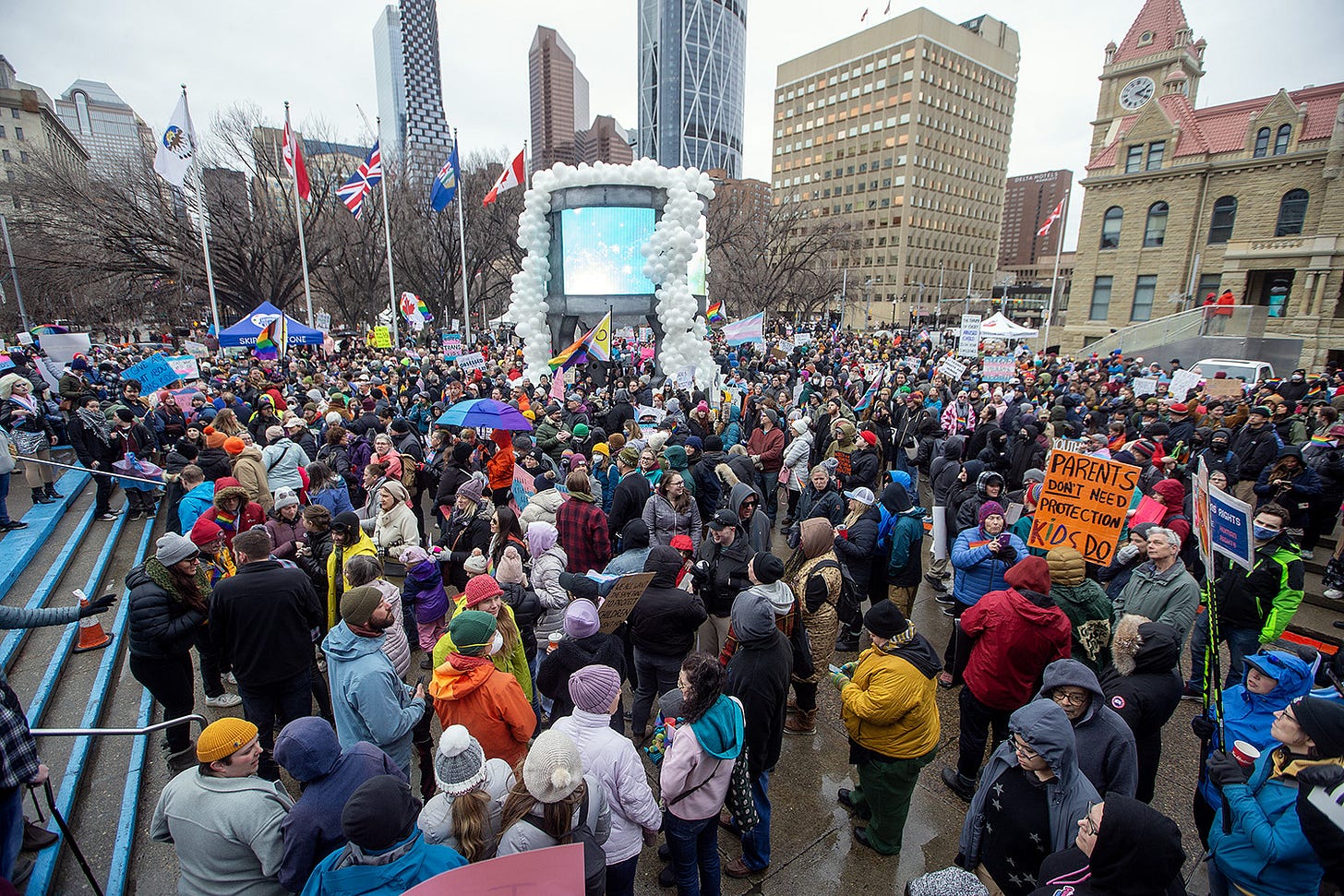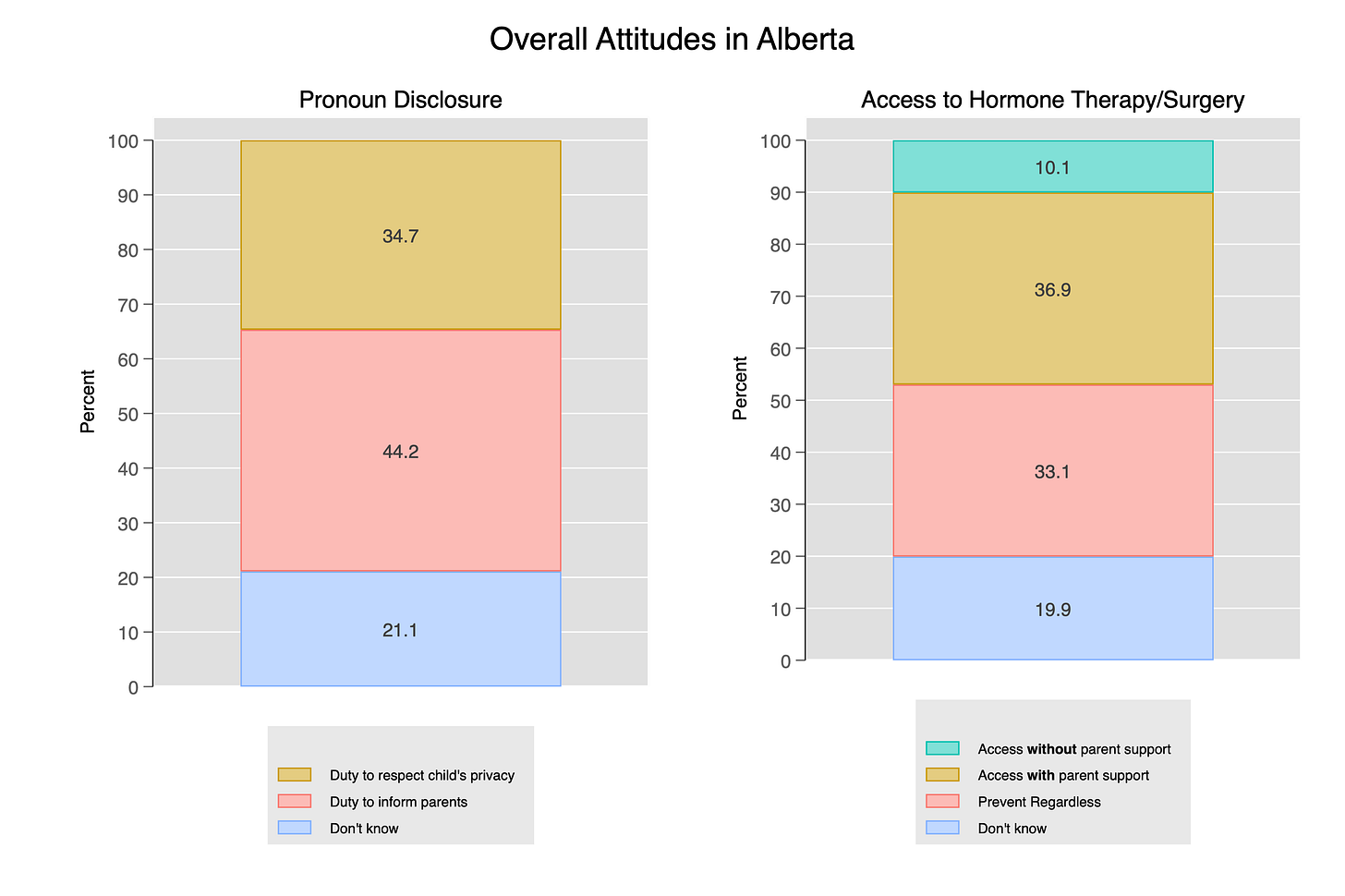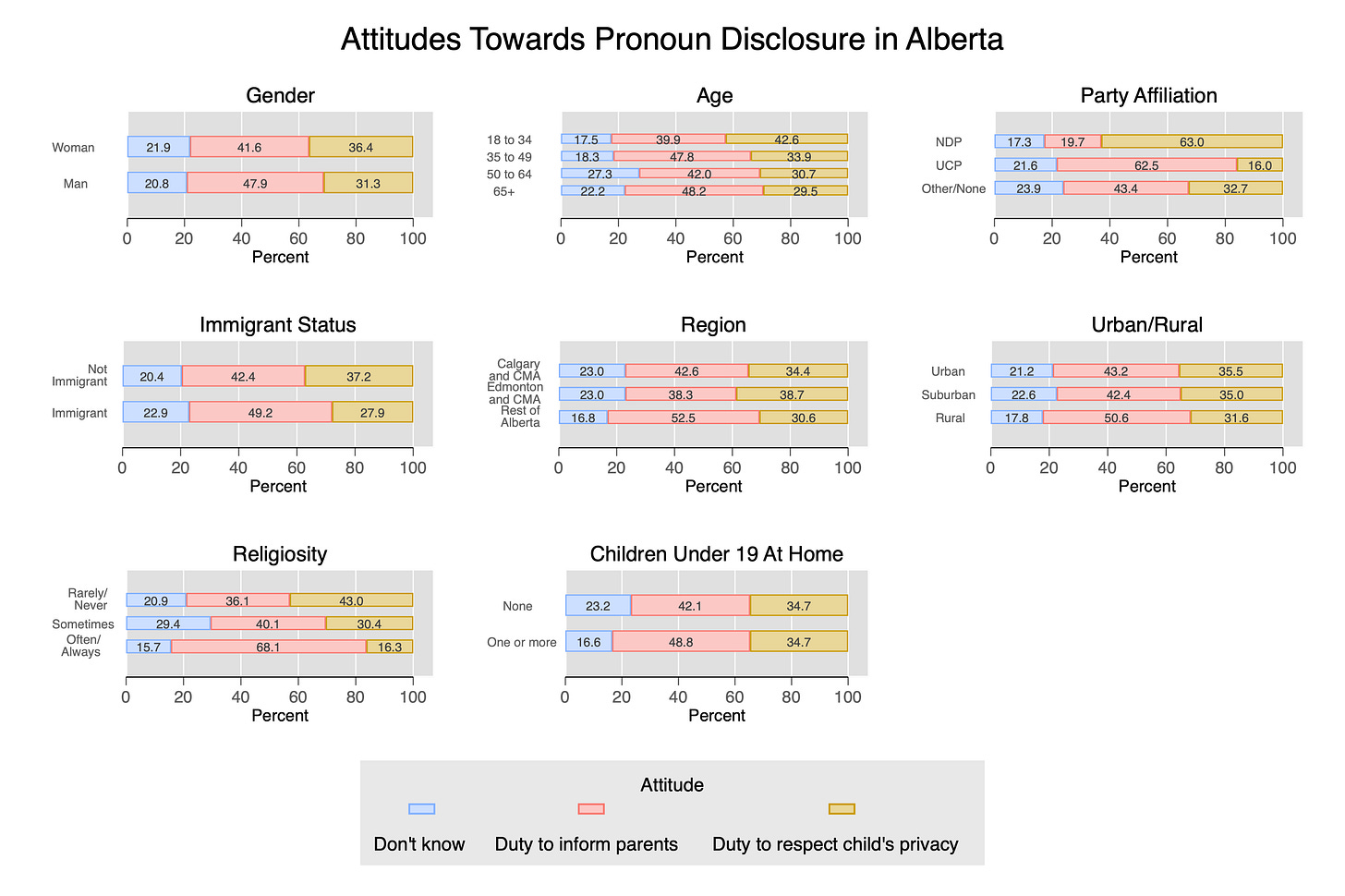What Albertans think about pronouns and gender affirming care
While differences of opinion exist, many Albertans have not made up their minds.
By Feo Snagovsky

Last week, Premier Danielle Smith announced a host of proposed policy changes affecting the ability of children and teens in Alberta to access gender affirming care, or to go by their chosen pronouns at school without parental permission. Among the new measures are bans on top and bottom surgeries for those under 18 (the former is already very rare, and the latter already isn’t being done in Alberta ), bans on hormone therapy for those under 16, and mandatory parental consent for children under 15 to go by a different set of pronouns than they were assigned at birth.
Why make this move?
Last week’s proposed measures have drawn fire from the LGBTQ+ community, social workers, doctors, the mayors of Edmonton and Calgary, federal and provincial politicians, and teens themselves. However, polling from the Angus Reid Institute suggests that the “vast majority” of Albertans support pronoun disclosure.
Given that these measures represent an apparent reversal of her own personal beliefs, why did Premier Smith decide to go down this path?
Politics seems to be the obvious answer, and journalists have speculated that the decision was meant to appease the Take Back Alberta and religious conservative segments of the UCP base. Indeed, the move has drawn praise from the group’s founder and many on the far right of Canadian politics.
This is probably at least part of the answer. But the moves reveal other insights into public opinion in Alberta.
The numbers
In liberal democracies like Canada, it is widely accepted that minority rights should not be left solely to the whims of majority opinion. But politicians operate within the context of an Overton window — the scope of acceptable behaviour as viewed by most engaged citizens. Understanding these prevailing political attitudes helps us understand why politicians might make the decisions they do.
Our lab at the University of Alberta, Common Ground, seeks to understand political culture and public opinion in Alberta – with a goal of trying to bridge political divides and ultimately inform efforts to reduce political polarization. As part of that project, we run a regular survey of political attitudes in Alberta called Viewpoint Alberta. We were in the field last summer after New Brunswick announced a similar, but much more limited, set of policies. Our data give us some insight on what the Premier may have been thinking as she went down this path, since she would almost certainly have consulted her own internal polling. Moreover, our sample size is more than three times as large as Angus Reid’s sample of Alberta voters (1,481 vs 401) and goes into more detail.
We asked our respondents last summer to first imagine a child aged 12-17 in their town who began to identify with a gender that is different from the one they were born as. We then asked them to imagine the same child wanted to use hormone therapy or surgery to transition to the gender they most closely identify with.
Many people haven’t made up their minds
Our findings show that, contrary to Angus Reid’s data, Albertans are divided on both questions. A plurality of Albertans – 44 percent – think schools should have a duty to inform a child’s parents if they want to use new pronouns. By contrast, 35 percent think the school should have a duty to respect the child’s privacy.
On hormone therapy and surgery, the results are somewhat different. Only 10 percent of Albertans think that children 12-17 should be able to access those treatments without parental consent, while 37 percent think that they should be subject to parental permission. Only one-third of respondents thought that the state should prevent these treatments regardless of what parents think. That means that almost half of respondents – 47 percent – think that these services should be available (one way or another), while only a third think they shouldn’t.
What was most striking about these numbers was how many people said they didn’t know. About one-fifth of respondents said they fell into this camp, which is a lot more than say they don’t have a view on most other policy issues. This suggests that there is a persuadable middle group of voters between the various sides of this issue.
Other cleavages dominate
Albertans’ views on these issues depend a great deal on who they are. Not surprisingly, there was a huge partisan divide on both pronouns and gender affirming care. Almost two-thirds of NDP supporters – 63 percent – thought that schools should have a duty to respect a child’s privacy with regards to pronouns. Almost the exact same percentage of UCP supporters had the opposite view – that schools should have a duty to inform parents.
Religiosity was also a huge driver of difference. More than two-thirds of those who often or always turned to religion to help deal with problems in their lives thought that schools had a duty to inform, while just over one-third of those who rarely or never did thought the same. Together, these findings support the view that the UCP’s religious conservative base was a likely factor behind the Premier’s decision.
Huge differences exist between those who live in Edmonton and Calgary, and those who live in the rest of Alberta. More respondents in Calgary thought that schools had a duty to inform than thought schools had a duty to protect children’s privacy. Given Calgary’s key status as an election battleground, this might well have been a key motivator behind the decision. Immigrants and those with children under 19 at home were also more likely to favour parental notification.
The numbers look quite different on parental input for gender affirming care, such as hormone therapy and surgical options. UCP supporters and the most religious respondents thought that the state should prevent access to gender affirming care outright — regardless of what parents had to say about it. Every single other demographic disagreed; a plurality of men and women, every age group, both immigrants and non-immigrants, those who lived in cities, suburbs, and rural places, in Calgary, Edmonton or the rest of Alberta, and parents and non-parents thought that children should have access to gender affirming care. The overwhelming majority of this group thought that this care should be available with parental support, but a consistent minority thought that children should have access to this care even without parental guidance.
What is striking here again is how many respondents hadn’t made up their minds yet; even one in six UCP respondents decided one way or another. This suggests that these issues are far from resolved, and that for groups looking to make headway on trans rights in Alberta, persuasion is not only possible – but essential.
The road from here
The goal of this analysis was to help make sense of the politics of Danielle Smith’s move. Her recent policy announcements on pronoun use in schools are most popular among UCP supporters, religious folks, and those who live outside of Calgary and Edmonton. However, more people in almost every demographic group thought that children should have at least some access to gender affirming care than those who thought these treatments should be banned outright.
None of this says anything about whether the Premier should have made this announcement. But understanding public opinion can help us make sense of why politicians act the way they do. This understanding also helps highlight opportunities for persuasion, because durable change can only take place with democratic consensus. We shouldn’t look to majorities to decide minority rights, but if we want those rights to become entrenched and to last from government to government, those interested in making change need to bring others with them as they make it.
Survey Methodology
Viewpoint Alberta conducted an online survey from July 4th to August 5th, 2023 among a representative sample of 1,481 Alberta adults through Leger. The figures are weighted by age, gender, and region, according to census data.
Attitudes towards pronoun disclosure were measured through the question:
In recent years, there has been some discussion about how involved parents or schools should be in the lives of transgender kids. Imagine a child aged 12-17 in your home town begins to identify with a gender that is different from the one they were born as. Which of the following opinions most closely reflects what you think?
The school has a duty to inform the child’s parents that they identify as transgender
The school has a duty to respect the transgender child’s privacy, and should not tell the parents
Don’t know / not sure
Attitudes towards gender affirming care were measured through the question:
Imagine the same child (aged 12-17) wants to use hormone therapy or surgery to transition to the gender they most closely identify with. Which of the following opinions most closely reflects what you think?
The child should be able to access hormone therapy or surgery, whether or not their parents agree with their decision
The child should be able to access hormone therapy or surgery if their parents support their decision
The government should prevent children from accessing hormone therapy or surgery, whether or not the parents support the child’s decision
Don’t know / not sure





